
scrounge: /skrounj/ informal verb: to actively seek [books] from any available source
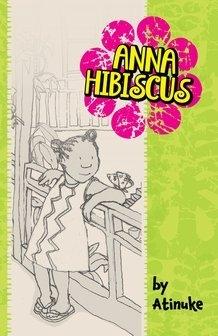
Anna Hibiscus is a short, four-chapter book about a girl who lives in Africa... "Amazing Africa." She is part of a large, busy extended family who live in a large white house and are always there for each other -- which can sometimes get to be too much, as the first chapter begins with Anna going on a vacation with her parents and siblings. But before long, they realize just how important it is to have all the various members of their family around -- from the cousins to the uncles, aunties, and grandmother and grandfather.
My children (7 and 4) both enjoyed this as a read-aloud, and I loved getting this little glimpse of a family living in Africa, though there are still some connections to North America, as Anna's mother is Canadian and she also has an (African-born) aunt who lives in America. I remember watching a TED talk by Chimamanda Ngozi Adichie talking about the danger of believing a "single story" about a person or place, but specifically Africa and the way the continent and its people are often portrayed in American media. Like Adichie, the author of this book, Atinuke, is Nigerian-born, and while we're not told which country Anna Hibiscus lives in, the characters and setting are portrayed in a familiar, loving way -- in a way that adeptly highlights both differences and similarities between the lives of Anna and the hypothetical American reader.
While Anna's family appears financially secure, poverty is touched on in a couple chapters, and I thought it was handled especially well in chapter 3 when Anna wants to sell oranges like the girls she sees out on her street. It could be a good lead-in to discussing things like poverty, responsibility, and privilege. We're looking forward to reading more in this series!
Scrounged From: Amazon
Format: Paperback
Author: Atinuke
Illustrator: Lauren Tobia
Pages: 109
Content Advisory: None
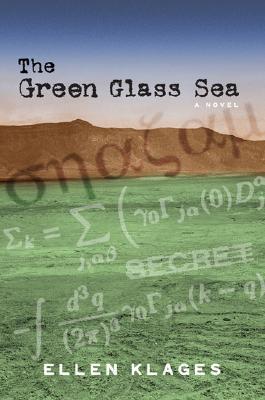
The Green Glass Sea is a very interesting idea for a book -- it tells the story of a gradual friendship between two girls who live in Los Alamos -- a place that didn't exist on paper during World War II, because it's where scientists worked on the atomic bomb. Both Suze and Dewey have parents who are working on the "gadget," and both girls are misfits to one degree or another. When they have to live together, they begin to learn to appreciate each other's strengths.
Aside from the friendship, this story is filled with details of the period. While some scenes were, I thought, I bit overly detailed and slow, items and places are still very thoroughly described. This novel also contains positive characterizations of a woman scientist and a girl who is an engineering nerd. At the very least, this has piqued my interest for Los Alamos and what it must have been like to live there as a kid. While the story doesn't go into detail about the ethical issues surrounding the atomic bomb, that is at least alluded to by the end.
Scrounged From: PaperbackSwap.com
Format: Paperback
Author: Ellen Klages
Pages: 324
Content Advisory: A few "minor" swear words, a couple scenes of bullying, and a parental death is described (not graphic)
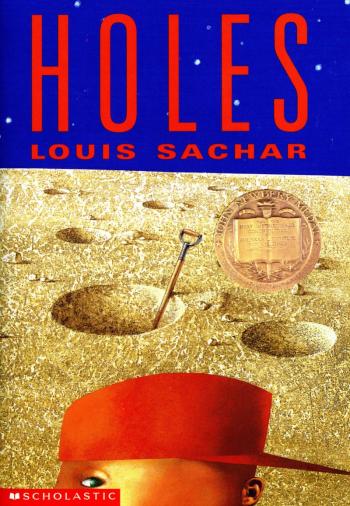
Holes is a book that sat on my to-read pile for a long time, because I'd already seen the movie a few years back, so I wasn't as eager to read a story I'd already heard. Still, not only did I really enjoy the book, but it reminded me how much I really did enjoy the movie as well.
Even though I remembered quite a few of the details, I'd pretty much forgotten the ending, so it was nice that the story added details to what I already knew but saved some surprise for what I didn't.
Stanley Yelnats (yes, his name is a palindrome) is arrested after a freak accident makes it appear that he stole a famous baseball player's shoes. His family's life has generally been unlucky, and they blame it all on his great-grandfather who brought a curse on his family after neglecting to fulfill a promise he made to a friend.
Stanley is sent to Camp Green Lake, which was once a lake but is now a desert, and the boys at the camp are required to each dig a hole in the ground every day.
It's an odd premise, but I love how the story occasionally flashes back in time to build layers of story until things gradually begin to make sense and you start to see how different characters are interrelated -- dare I say, it's a bit like an onion. Due to the complexity, it's not surprising that the movie doesn't deviate very much from the story, and it's neat that the author wrote the screenplay as well.
Sachar doesn't waste words as he describes the odd characters and their interactions, and so the book flows quickly along. I really enjoyed the story, and now it makes me want to watch the movie again.
Scrounged From: A local flea market
Format: Paperback
Author: Louis Sachar
Pages: 233
Content Advisory: A couple scenes involve violence -- some descriptions of death but not gratuitous.
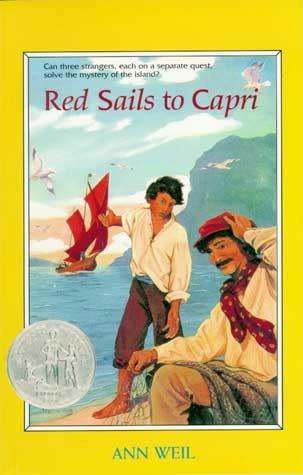
The title of Red Sails to Capri confused me initially. Was "Red" a person who sailed to Capri? Or did something with red sails sail to Capri? And if so, what and why? All that aside, I ended up enjoying this book more than I thought I would.
The sails indeed belong to a ship which shows up in the harbor of Capri, carrying three travelers who are each looking for something slightly different. They stay at an inn owned by the family of Michele, a boy who is the main character. The travelers eventually become intrigued by a cove on the island that the locals fear -- and yet no one seems to know why. I won't give too much away, but it was fun to see adventure trump fear here, and even neater to realize that the name of this cove is an actual place on the island of Capri in Italy -- be sure to google it once you've finished!
I wouldn't really call this story a "mystery" just because there is a bit of mystery in it -- but still, I enjoyed the eccentric characters, especially the banter between Michele and Angelo, and also Michele's mother, a cook who has a complicated repertoire of songs that must be sung to her food at just the right time, or else it is ruined. She treats her dishes and ingredients as if they were cantankerous people who must be appeased before they deliver the finished product.
Scrounged From: A friend on GoodReads
Format: Paperback
Author: Ann Weil
Pages: 160
Content Advisory: I don't remember anything objectionable for the age group it's aimed at.
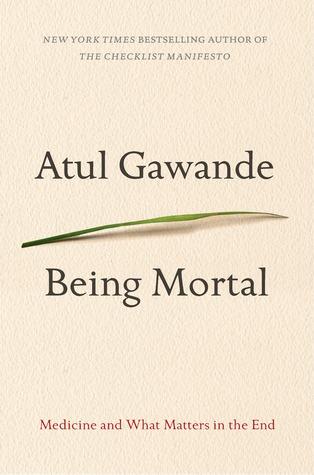
Being Mortal: Medicine and What Matters in the End was such a much-needed look at how the medical system treats death. I had wondered whether it would be depressing to read, and there were certainly sad moments and stories, but it was also hopeful and uplifting, and I found myself losing track of time while reading it sometimes. Even when statistics and information are provided, the narrative moves smoothly enough into stories and commentary to not get bogged down.
Gawande traces some of the history of the way humans have treated end-of-life care, emphasizing the advent of the nursing home, as well as "assisted living" and other attempts to bridge the gap between the hospital and the home. He also includes the stories of the (non-elderly) terminally ill as he explores the questions of what people who are dying really need -- and how we even get to the point where we are able to recognize "dying" for what it is, when we try to stave off death at any cost. He says:
“The problem with medicine and the institutions it has spawned for the care of the sick and the old is not that they have had an incorrect view of what makes life significant. The problem is that they have had almost no view at all. Medicine’s focus is narrow. Medical professionals concentrate on repair of health, not sustenance of the soul. Yet—and this is the painful paradox—we have decided that they should be the ones who largely define how we live in our waning days.”
He contrasts the traditional attitude of medicine, which is to solve problems and offer as much information and possibilities as it can, with the type of care (hospice) that looks to instead focus on the here and now rather than sacrificing the "now" for slim and unlikely future gains for the elderly and terminally ill -- but as he illustrates, it can be very difficult to draw that line.
There were so many eye-opening things to think about here. This is a book that will probably resonate with many people -- even those of us who are not elderly or terminally ill have loved ones who are or will be, and it's worth thinking about what is most important during that journey, and developing a little bit of preparation for difficult conversations that will inevitably happen.
Scrounged From: A local used book sale.
Format: Hardcover
Author: Atul Gawande
Pages: 282
Content Advisory: Naturally, in a book that discusses death, there are many descriptions of people who are aging and dying, as well as some descriptions of their ailments and medical procedures. As I said, some of these are very sad, but the tone of the book overall is uplifting. Other than that, I remember a few minor swear words, but nothing else that I'd consider objectionable. Gawande does briefly mention "assisted death" toward the end, but that's not what the book is about. While he doesn't appear to be opposed to the idea, he also critiques it, and emphasizes that this attitude leaves us in danger of not valuing "assisted living" enough.

